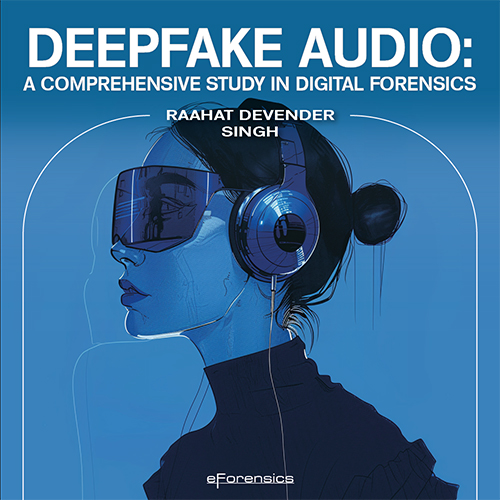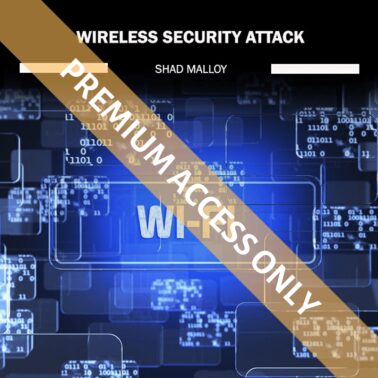No products in the cart.
Deepfake Audio: A Comprehensive Study in Digital Forensics (W62)
$319.00
This course is aimed at presenting an elementary yet comprehensive picture of the field of digital audio forensics, with the implied hope that it will afford the participant useful theoretical and practical knowledge of the field and its various aspects.
In stock
Get the access to all our courses via Subscription
Subscribe
Audio has been playing a crucial role in shaping the way we perceive the world around us, ever since the earliest moments of human history, and though our methods and technologies have evolved over the centuries, the way audio enriches our understanding of the world and shapes what we perceive to be the “objective reality” of things has only grown to be more profound and implicit.
Given the information carrying capacity of audio data and the ease and directness with which it delivers said information, it was only natural that audio would find applications within the forensic and legal realms of our society.
This course is aimed at presenting an elementary yet comprehensive picture of the field of digital audio forensics, with the implied hope that it will afford the participant useful theoretical and practical knowledge of the field and its various aspects.
We begin with a basic but ultimately essential discussion about the key concepts and principles related to digital audio and digital audio processes, subsequently moving on to examining audio from an evidentiary perspective and discuss how and in what capacity it can serve as evidence, and what forensic processes eventually pave the way for it to be accepted – or rejected – as an “incontrovertible proof” upon which legal decisions and judgements can be based.
All these forensic processes, that begin with the very collection of audio data and may end with the presentation of the analyst’s findings in court will be examined in detailed. More specifically, the course will explore the methods of operation of various forensic techniques, such as those used for audio enhancement, data integrity verification, audio authentication, speaker identification & verification, and deepfake detection (just to name a few). Finally, the participants will be presented with the various caveats of this field and its still open research challenges, with the intention that this information will help form a more realistic and grounded picture of the field of digital forensics and what it can and cannot achieve in a real-world setting.
Why this course?
We are living in an age where technology and misinformation have become intertwined, and the results have been unfavorable to our collective perceptions and belief systems about what constitutes the “truth”.
We tend to engage our critical thinking process only when made overtly aware of the presence of deceit; rest of the time, we’re on auto-pilot, simply accepting what we hear to be a fact free of falsehood. This tendency, albeit a natural one, has demonstrated its potential for great harm time and again, and the incessant advancements in AI and deepfake technologies only complicate the problem further.
One of the ways to counter this complication is to become aware of the abilities of certain scientific tools and methods that help examine data critically and objectively, thereby enabling unbiased decision-making when faced with the question of “reliability” of a given piece of audio information. This course will aim to engender that awareness.
Why take it now?
With greater advancements in technology and increase in the sizes of populations that regularly interact with the outer world (although mostly only through their screens) seemingly everybody has found a voice for their agendas. This massive and constant deluge of information – in conversations, in the news, on podcasts – leaves the listener either overwhelmed by or numb to the words being uttered.
But whether or not one lends credence to an angry podcaster’s rant while driving to work is not quite as pressing as whether a jury believes what appears to be a confession to a crime recorded surreptitiously by the speaker’s co-worker. Truth matters in both circumstances; it is just more consequential in the latter (although one could argue that the former might eventually harm society in far more insidious ways).
Whatever the case, it is better to equip oneself with the appropriate armor sooner rather than later, especially for battles that will only become harder with time.
Who is this course for?
- Researchers & Practitioners
- Forensic Analysts & Investigators
- Expert Witnesses
- General Enthusiasts & Fanciers of the Field
COURSE BENEFITS
What skills will you gain?
- Upon completion of the course, the participant will have acquired a firm grounding in the digital audio forensics domain, and thorough understanding of the audio forensic process, starting from the collection of data to the actual use of this data as evidence.
- The participant will also have gained practical knowledge of various audio forensic investigation procedures, which will help develop crucial analytical, problem-solving, and research skills.
- Altogether, the information contained in the course will serve as a strong foundation for the eventual development of a meaningful career in the audio forensics domain, or as an impetus for advancement of existing skills.
What will you learn about?
The course aims to provide participants with a comprehensive understanding of the digital audio forensics domain. Participants will gain:
-
- Deep understanding of fundamentals of digital audio and the technical operations and issues involved in digital audio processing. This technical information lays a foundation for the entire course and will be valuable for the comprehension of its subject matter.
- Knowledge of issues associated with evidential use and forensic analysis of audio evidence, including basic principles of collection, recovery, enhancement, analysis, and interpretation of audio evidence, and the essential considerations related to the admissibility of audio evidence in the court of law.
- Thorough understanding of the basic concepts and methods of operation of contemporary audio forensic technologies, including but not limited to audio authentication, speaker verification and identification, and deepfake audio forensics.
- Awareness of current and future challenges in the audio forensics domain, which will act as a platform for further career and personal development.
- Finally, an enhanced capacity for appreciation and discernment of the true potentials – both positive and negative – of this highly ubiquitous and utilitarian technology.
What tools will you use?
To be announced and publish soon!
COURSE PREREQUISITES
COURSE IS SELF-PACED, AVAILABLE ON DEMAND
DURATION: 18 hours
CPE POINTS: On completion you get a certificate granting you 18 CPE points.
Course materials publication date: October 17, 2023
Course format:
- Self-paced
- Pre-recorded
- Accessible even after you finish the course
- No preset deadlines
- Materials are video, labs, and text
- All videos captioned
What should you know before you join?
- Familiarity with computer audio/video files
- Familiarity with installing computer-based software from a website
- (Very) Basic programming skills (primarily in Matlab and Python)
What will you need?
- A computer with internet connectivity
- Open-source software (that will be downloaded from the internet or will be provided along with the course material, as the situation may demand)
COURSE SYLLABUS
Module 0: Before the course
- A general overview of the course and its contents in broad strokes, including a brief preface or prologue of sorts.
- Perhaps a list of some suggested reading material for familiarization with the subject matter.
Module 1: Digital Audio: Basic Concepts and Principles
This module covers the fundamentals of digital audio and audio processing. Coverage includes an overview of the digital audio capture process, the processes of analog-to-digital/digital-to-analog conversion, and concepts of filtering & sampling. Basic principles of digital audio encoding and audio formats, data losses & impairments, and important audio processing operations including noise reduction and compression are also covered. Note that the primary objective of this module is to familiarize the participants with those technical aspects of digital audio and audio processing that would be useful to them from a forensic standpoint.
- Description of basic concepts of digital audio: Audio capture process, analog-to-digital/digital-to-analog conversion, filtering & sampling
- Audio encoding & formats, audio compression
- Overview of technical issues related to audio recordings: Data losses and impairments (aliasing, jitter, quantization errors, clipping, transmission & generation impairments, encoding & transcoding impairments)
Tools covered: To be announced soon!
Module exercises:
Knowledge test (consisting of true or false type questions, multiple choice & reverse multiple-choice questions, and crossword puzzle)
Module 2: Audio Evidence and Forensic Principles
This module presents an account of the origin and history of audio with regards to its role as forensic evidence. Basic principles and issues related to content authenticity and admissibility are also discussed, along with a thorough analysis of the principles & procedures involved in the collection, recovery, enhancement, authentication, and interpretation of audio forensic evidence.
- Digital audio as evidence (including examples, case studies)
- Concerns regarding content trustworthiness
- Admissibility of audio evidence: Principles of general acceptance, issues & concerns
- Principles of forensic audio analysis: Acquisition, recovery, enhancement, integrity verification, authentication, interpretation, transcription
Tools covered: To be announced soon!
Module exercises:
- Knowledge test
- Mini-case studies
- Scenario-based exercises
Module 3: Digital Audio Forensics: Methods & Operations
This module begins with an exposition of the basic concepts and principles of digital audio enhancement and authentication, followed by exploration of integrity verification schemes such as hash value analysis and metadata analysis. Techniques for primary tasks involved in audio forensics, such as speaker verification & identification, and gunshot analysis are also discussed, followed by assessment of the limitations and caveats of these techniques. The module concludes with as assessment of the current research issues & challenges, as well as some directions for future research.
- Audio enhancement techniques
- Integrity verification (metadata analysis, hash value analysis)
- Methods of audio authentication
- Methods of speaker verification & identification
- Gunshot analysis
- Overview of effect of environmental factors & recording conditions on audio forensic processes
- Current research issues & challenges, future research avenues
Tools covered: To be announced soon!
Module exercises:
- Knowledge test
- Practical experiments
Module 4: Audio Forensic in the Deepfake Era
This module describes in detail the challenges advanced AI and deepfake technology present to the already complicated realm of audio forensics, and introduces thorough analysis of specialized methods of deepfake audio detection (including an assessment of the situation when audio is present in conjunction with video). Coverage also includes a discussion of the scope and limitations of the threats presented by deepfake technology within the context of the audio forensics domain with special focus on social engineering.
- Deepfake technology and its growing role in social engineering
- Impact of deepfake technology on audio forensics
- Methods of deepfake audio detection
- Deepfake audio in conjunction with falsified video: Threats & solutions
- Deepfake technology and the audio forensic realm: Scope & limitations
Tools covered: To be announced soon!
Module exercises:
- Knowledge test
- Scenario-based exercises
- Practical experiments
YOUR INSTRUCTOR - RAAHAT DEVENDER SINGHT, PhD
Raahat Devender Singh, PhD, is a researcher and practitioner working in the digital forensics domain since early 2014. She is the founder of Satyavakta Solutions LLP, a forensic agency based in Chandigarh, India, and contributes to the forensic domain through original research (featured in magazines and scientific journals of various publishing houses including Springer, World Scientific, and Elsevier), as a reviewer and editor of scientific literature, and in the form of forensic courses designed for global audiences from various walks of professional lives with varied educational backgrounds and specialties.
Contact:
If you have any questions, please contact us at [email protected].
Only logged in customers who have purchased this product may leave a review.





Reviews
There are no reviews yet.